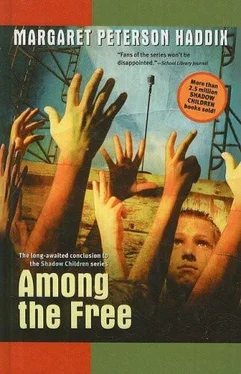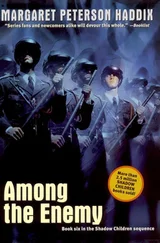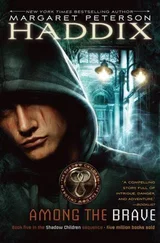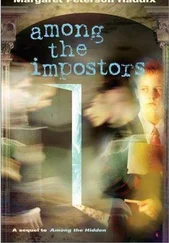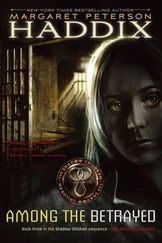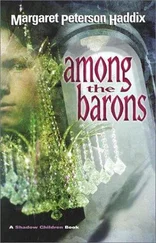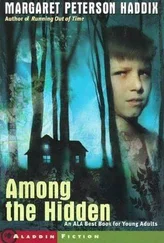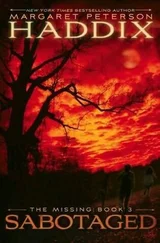Among The Free
Margaret Peterson Haddix
Luke Garner stood shoulder to shoulder with a dozen other boys, waiting. It was six a.m., time for the daily inspection of all workers at Population Police headquarters, when all their uniforms had to be perfectly fitted, perfectly spotless, perfectly pressed; all their spines perfectly straight; all their expressions perfectly obedient. But Luke and the boys beside him were stablehands, the lowest of the low, so even though they had to line up outside at six am., sometimes it was six thirty or even seven before the sergeant stalked down the row. He'd peer at them suspiciously, assigning extra work any time he saw a wayward lock of hair, a wayward crease in a uniform, or even the suspicion of a smirk on a boy's face.
"You!" he'd bark. "Shovel all the manure from stall one into stall two. And then shovel all of that into stall three…"
Only the stupidest boy would protest that that method was inefficient and would take twice as long, that his time might be better spent doing some other chore. All the boys in this lineup had learned not to be that stupid. Once, a long time ago, soon after Luke had arrived at Population Police headquarters, a boy had dared to question a task "Isn't there a bigger shovel I can use? It'd go faster that way." The boy had been beaten in full sight of all the other boys.
And then he'd disappeared.
Luke had not made any friends in the stable. The unspoken rule seemed to be Keep to yourself. But Luke spent a lot of time thinking about the boy who had dared to ask a question, the one who'd disappeared.
'Attention!" It was the sergeant, arriving earlier than he ever had before.
"Yes, sir!" Luke shouted back with the other boys, snap' ping his arm up into a salute. He worried that his arm had come up too late, that his "yes, sir!" had been a split second too slow, that he'd be singled out for punishment. The sergeant narrowed his eyes, seeming to stare straight at Luke, and Luke's heart pounded in his chest. But then the sergeant's gaze fell on the next boy in the line.
"You are worthless stableboys," the sergeant spat out. He glared at each boy in turn. "You're no better than the manure you wallow in."
"Yes, sir!" Luke and the other boys yelled. They'd been trained. They knew what they were supposed to say.
"But. ." The sergeant paused. This was different. Usually he could go on berating them endlessly. "Some of you will have a chance to better yourselves." A new tone had entered his voice. Slyness? Uncertainty?
For the millionth time since he'd left his home nearly a year earlier, Luke wished he could understand other people better, that he could see through their lies to hear what they were actually saying.
"Some of you will be called to a higher purpose," the sergeant continued. "Some of you will be reassigned to a new task for the glory of our country."
None of the boys dared to move, but Luke could practically feel the others around him wanting to exchange glances, to see if anyone else knew what the sergeant was talking about. Higher purpose? New task? What did that mean?
Another man strode up beside the sergeant. He was taller, more imposing. His uniform was more crisply pressed, and he had a row of medals on his chest.
"I'll choose," he said imperiously.
He walked up and down the row of boys, peering care' fully at each one of them. Luke held his breath, as if exhaling might call too much attention to himself. He didn't want to be reassigned. He liked working with the horses. They were. . safe. The stables were a good place to hide.
I, for one, have had enough of hiding. Words a friend had spoken months ago echoed in his mind. Luke had not come to Population Police headquarters looking for safety; only a fool would want to hide there. Luke and his friends had had plans. They'd had dreams. But they hadn't realized how big Population Police headquarters were, how difficult it would be just to pass a message from one person to another. Luke couldn't be sure he and his friends had accomplished anything. Sometimes when he was brushing down a horse, he'd whisper into the horse's quivering ear, "Maybe I am just a worthless stableboy. Maybe that's okay."
Luke had spent most of his thirteen years around hogs, not horses, and any hog would have looked back at him with its piggy eyes as if to say, So? You think I care? But the horses looked at Luke as if they understood. One horse in particular had a way of sliding her nose under Luke's arm as if she were comforting him, as if she wanted to say, I know you've been through a lot. I know you've been hurt and hungry. I know you miss your family and friends. I know you're scared. You just stay right here with me and you'll be fine. Secretly, Luke called this horse Jenny, in memory of a friend of his, Jen Talbot. But deep down he knew that the human Jen would not have been so comforting. Jen probably would have screamed at him: What you are talking about? You're not just some worthless stableboy. You're important! Go out and change the world!
Luke was starting to feel a little dizzy from not breathing. He dared to ease a little air out of his lungs, to take another shallow breath.
The man with the medals on his chest was taking his time walking down the row of boys, staring into their eyes, reaching out to test their arm muscles.
"You," the man said, picking out the tallest kid in the row and shoving him to the other side of the room. 'And you," he said, yanking the most muscular boy out of the line.
Luke allowed himself to take a deeper breath. He let himself notice how cold it was out here in the early morning chill, and think about how much warmer it would be back in the stables. Two down, only one to go — he was probably safe. Of the boys remaining, he wasn't the tallest or the heaviest or the strongest. He was just a typical scrawny kid.
The man narrowed his eyes, examining the boys left in the lineup. He grabbed one boy's head so he could stare into the boy's ears; he studied another boy's straw-colored hair. Luke half expected the man to reach into some boy's mouth to look at his teeth, the way the head groom did with the horses.
Good thing Mrs. Talbot managed to get the braces off my teeth, Luke thought. He had a flash of remembering a light-hearted moment in the midst of sorrow and fear: him and his friends laughing in a cozy cottage while Mrs. Talbot tugged on metal bands and wires and protested, "Look, kids, orthodontia is not my specialty. What do they put these things on with? Cement?" In that moment, Luke hadn't cared that the braces endangered him, linking him to a suspect past. He hadn't even cared that all her tugging and scraping hurt. He'd just been happy to laugh with his friends.
Now something caught in his throat, and he had to swallow hard to fight back his memories, to hold back his sense that he deserved to be — no, that he was —more than a worthless, lonely stableboy. Maybe he made a little noise, deep in his throat. The man with the medals on his chest snapped his head toward Luke, focused the gaze of his narrowed eyes squarely on Luke's face. The man gave Luke a cruel, thin-lipped smile. In horror, Luke watched the man slowly lift his arm — higher, higher, and higher, until it was aimed straight out from his body, the first finger extended.
"You," the man said.
He was pointing at Luke.
Luke sat numbly in the backseat of a huge van. He'd been given no explanation of where he was going, no chance to gather up his belongings or to say good-bye to anyone. Luke wasn't sure he wanted to know where he was going, and he had no belongings to speak of anyhow. But as the car passed out of the gates of Population Police headquarters, he had to bite back a scream: No, wait — stop! I have to talk to Nina and Trey and Nedley and Matthias. And, oh, Mark — my brother — I don't even know if he's here! Please! I have to tell them —
Читать дальше
